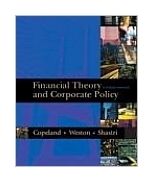|
||
• wydawnictwa polskie
• Zamów informacje o nowościach z wybranego tematu • kontakt
• Cookies na stronie |
FINANCIAL THEORY AND CORPORATE POLICYCOPELAND,WESTON,SHASTRIwydawnictwo: PEARSON , rok wydania 2005, wydanie IVcena netto: Financial Theory and Corporate Policy, 4/E Thomas E. Copeland, The Monitor J. Fred Weston, The Anderson School, University of California, Los Angeles Kuldeep Shastri, Joseph M. Katz Graduate School of Business, University of Pittsburgh Description This classic textbook in the field, now completely revised and updated, provides a bridge between theory and practice. Appropriate for the second course in Finance for MBA students and the first course in Finance for doctoral students, the text prepares students for the complex world of modern financial scholarship and practice. It presents a unified treatment of finance combining theory, empirical evidence and applications. Features
Table of Contents I. FINANCIAL THEORY. 1. Introduction to Capital Markets, Consumption and Investment. 2. Investment Decisions: The Certainty Case. 3. Theory of Choice Under Uncertainty: Utility Theory. 4. State-Preference Theory. 5. Objects of Choice. 6. Market Equilibrium: CAPM and APT. 7. Pricing Contingent Claims: Option Price Theory and Evidence. 8. Futures Contracts and Markets - Term Structure - Cox, Ingersoll, Ross. 9. Multiperiod Aspects of Financial Theory - Real Options - Investment. 10. Efficient Capital Markets: Theory. 11. Efficient Capital Market: Evidence. 12. Information Asymmetry: Agency Cost Theory and Signaling. II. CORPORATE POLICY. 13. The Role of the CFO and Performance Measurement. 14. Valuation and Tax Policy. 15. Capital Structure. 16. Dividend Policy. 17. Applied Issues in Corporate Finance. 18. External Investment Decisions. 19. International Finance: Theory and Evidence. 20. Open-Ended Issues for Research. 998 PAGES Księgarnia nie działa. Nie odpowiadamy na pytania i nie realizujemy zamówien. Do odwolania !. |


